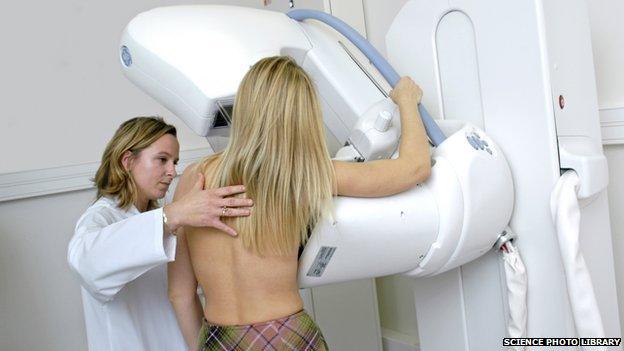Breast cancer drug Kadcyla ruled out for use by NHS Scotland
- Published

It is thought about 120 women in Scotland could have benefited from the drug
The organisation which decides which medicines should be routinely available on the NHS in Scotland has decided not to approve breast cancer drug Kadcyla.
Cancer charities argued the drug adds an average of six months to the lives of some women whose breast cancer has become inoperable.
Women in England, Wales and Ireland have already been refused access to the drug on cost grounds.
The Scottish Medicines Consortium also had concerns about cost effectiveness.
The SMC said it had to consider value for money and take account of the needs of all patients who need treatment, not just those affected by this medicine.
Earlier this year the SMC was reformed to give patients and clinicians a greater say on which new medicines are approved.
Quality-to-cost ratio
The drug approval body for England and Wales, NICE, ruled in August that Kadcyla was still too expensive to be approved for routine NHS use.
It led to claims by the manufacturer Roche that the system was "broken".
NICE generally approves treatments which cost no more than £30,000 per year of better-quality life.
In the case of Kadcyla, NICE said the quality-to-cost ratio had been calculated at £166,000.
The Irish equivalent of NICE and the SMC, the National Centre for Pharmacoeconomics, has also ruled that Kadcyla is not cost-effective.
The only way women will be able to access it will be through a new Peer Approved Clinical System (PACS).
They will need the support of their consultant to argue that the drug offers them particular benefit over and above what has already been considered by the SMC.
'Devastating condition'
Prof Jonathan Fox, chairman of the SMC, said the organisation was "disappointed" not to have been able to recommend Kadcyla, which is also known as trastuzumab emtansine.
He said it had "taken on board" the drug's effectiveness and applied as much "flexibility" as possible in its considerations. Ultimately, however, "the committee felt unable to accept it."
He said: "While the PACE process is a determining factor when we consider medicines like this, and was designed to increase access to such medicines, that access cannot come at any price - we have to consider value for money and take account of the needs of all patients who need treatment, not just those affected by the medicine under consideration. NHS Scotland does not have infinite resources.
"This is a devastating condition and we understand that this decision will be very disappointing for patients. Most of our committee members are practising clinicians who care for patients daily and the decision to not recommend a life-extending medicine is never taken lightly.
"Local NHS boards have processes in place to allow clinicians to prescribe medicines that are not accepted for routine use by the SMC. We would welcome a resubmission for trastuzumab emtansine that takes into account the issues raised by the SMC appraisal."
'Deeply disappointing'
James Jopling, the Scotland director for Breakthrough Breast Cancer, said: "Support for this drug has united the entire breast cancer community.
"Patients, families, carers, oncologists and all four breast cancer charities in Scotland have called for this medicine to be approved. In addition, over 1,800 members of the public have signed our petition calling for more medicines like Kadcyla to be made available in Scotland.
"So this is a deeply disappointing outcome and, though we recognise the very high cost of this medicine made it hard for the SMC to approve, it becomes more vital than ever that pharmaceutical companies do more to set the cost of new medicines at a price the NHS can afford."
He continued: "Access to drugs for people who really need them is an ongoing problem and Breakthrough is leading the call for a solution to be found. We are determined to stop breast cancer for good, and making sure every woman receives the treatment she needs is the first step."
Health Secretary Alex Neil said: "As happens currently, any patient with secondary breast cancer whose clinician believes that Kadycla will be of significant benefit can make a request to their health board to access the drug.
"There are already patients in Scotland being treated with Kadcyla, funded by the NHS, and this will continue with the additional funding pledged by the Scottish government.
"However this is clearly not the ideal situation for patients and clinicians in Scotland, and I hope that the manufacturer will resubmit Kadycla quickly and at a fair price."